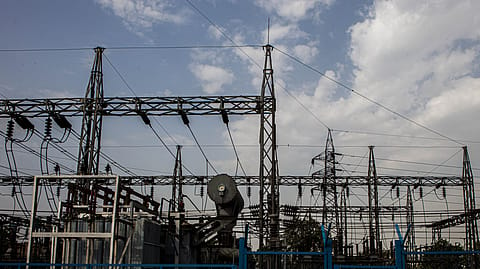AT&C losses down from 23% to 16% due to reforms: Power Ministry
The Centre launched the revamped distribution sector scheme (RDSS) – a reform-based and results-linked scheme in July 2021.

Reforms introduced in the power sector across the country have started showing results with the average Aggregate Technical & Commercial (AT&C) loss of distribution utilities in country has reduced from 22.32% in FY 2020-21 to 16.44% in FY 2021-22, says the latest data released by the Union power ministry.
The Centre launched the revamped distribution sector scheme (RDSS) – a reform-based and results-linked scheme in July 2021. The aim was to transform the electricity distribution sector at an estimated outlay of ₹3,03,758 crore with Gross Budgetary Support (GBS) of ₹97,631 crore from the Union Government.
"The main objective of the scheme is to improve the operational efficiencies and financial sustainability of distribution sector so as to facilitate 24x7 quality and reliable power for all at affordable price. The scheme envisages target of reducing the AT&C losses to 12-15% at pan-India level and ACS-ARR gap to zero by 2024-25," said a senior Union power ministry official.
The scheme provides for financial assistance to distribution companies (Discoms) to implement prepaid smart metering for consumers and strengthening of distribution infrastructure based on a 2-tier evaluation framework comprising of pre-qualification criteria and result evaluation matrix of various performance parameters with yearly targets.
"Discoms to qualify for receiving grant funds under the scheme need to mandatorily comply with the pre-qualifying criteria and also achieve basic minimum benchmarks score of 60% as per result evaluation matrix approved for each of the discoms," says the official.
Similarly, there has been an improvement in the average revenue realisation by the discoms. Timely payments of subsidy and government department dues by state governments have also contributed to increased revenue.
"All these have resulted in reduction of ACS-ARR gap for discoms. The ACS-ARR gap has also significantly reduced from ₹0.69/kWh in the financial year 2020-21 to ₹0.15/kWh in financial year 2021-22. Due to this, the financial health of discoms is improving and they are in much better position to ensure quality and reliable power supply to consumers," says the official.
Recommended Stories
The pre-qualification criteria include timely publishing of audited annual accounts and un-audited quarterly accounts, timely release of subsidy and government department dues by State/UT, no new creation of regulatory assets, pre-paid metering of government departments, timely payment of generation companies' dues and timely publishing of tariff & orders by regulators.
"The result evaluation matrix comprises of various performance parameters in four categories viz. financial sustainability, operational–outcomes of infrastructure works, infrastructure works & policy & structural reforms, capacity building and IT/OT enablement," says the official.
Under the RDSS, it has been envisaged to leverage advance technologies like Artificial Intelligence, Machine Learning and Blockchain Technology to analyse data generated through IT/OT devices to enable the discoms to take informed decisions on loss reduction, demand forecasting, asset management, time of day (ToD) tariff, renewable energy (RE) integration and for other predictive analysis.
This would contribute a great deal towards enhancing operational efficiency and financial sustainability of the discoms. Gross budgetary support under the scheme would be used for development of applications related to use of advanced ICT like AI, Machine Learning and Blockchain Technology in the distribution Sector.
(INR CR)
"Powerthon-2022, SINE-IIT Bombay has been appointed as incubator by Ministry of Power. Key problem areas have been identified after discussions with discoms. Technology service providers (TSPs) with capacity to solve the problems were identified which includes startups, non-startups and individuals. Pilots were then conducted with the discoms with a corresponding problem statement," says the official.
The Ministry of Power on a regular basis organises review, planning & monitoring committee meetings which are attended by principal secretaries (power) and CMDs/ MDs of discoms of all states and UTs. In the meeting, states/ UTs who have adapted any good practice, showcases it to all other discoms and the same can be adapted by any discom to improve efficiency.